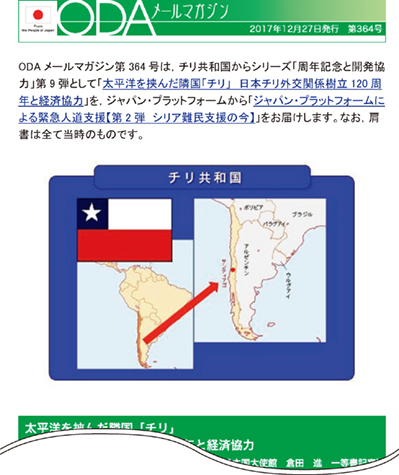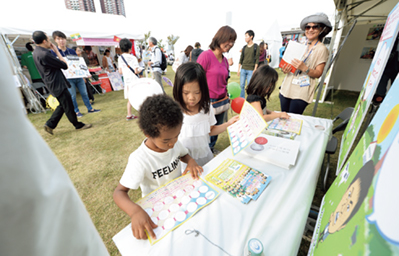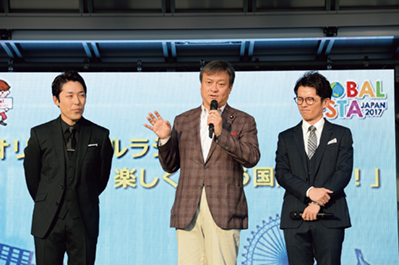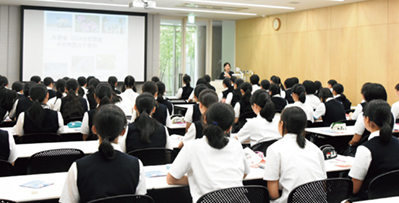4. Efforts for Strengthening the Foundations for the Implementation of Development Cooperation in Japan
(1) Efforts for Information Disclosure and Promoting Public Understanding and Support
The Development Cooperation Charter (decided by the Cabinet in 2015) highlights the importance of gaining public understanding and support for sustainable development cooperation.
MOFA and JICA are encouraging public participation in development cooperation at various levels and in a variety of ways including: promotion of discussions and dialogues regarding development cooperation; promotion of development education; information disclosure regarding the current status of development cooperation; and dissemination of relevant information to various regions and a wide range of people. In addition, MOFA and JICA provide opportunities for a broad range of Japanese nationals to directly participate in development assistance in developing countries, and to experience ODA in the field. At the same time, MOFA and JICA recognize the importance of human resources development, research cooperation, and public-private partnership (PPP) in order to respond appropriately to the increasing diversity and complexity of development issues. Similarly, it is important to enhance understanding in the international community towards the concept of Japan's development cooperation, and cooperation with NGOs as well as educational and research institutions such as universities is becoming increasingly important.
Furthermore, ensuring that Japanese assistance is known by many people not only in Japan but also in developing countries, is an essential process for the implementation of ODA projects. Thus, Japanese diplomatic missions and overseas JICA offices are making coordinated efforts on public relations activities in developing countries.
A. Strengthening public relations, information disclosure, and information dissemination
MOFA and JICA are making efforts to release and disseminate accurate information by linking to each other's ODA-related websites.(Note 12) In addition, MOFA publishes an ODA email magazine, which introduces field experiences and episodes about development cooperation by the staff of Japan's overseas diplomatic missions, members of JICA, employees of NGOs, and employees of private sector companies stationed in the field.
Since 1993, MOFA has been putting effort into broadcasting TV programs to raise the Japanese people's interest in international cooperation, and to enhance their understanding. In 2017, the special program “Team Earth Smile of the Interstellar Spacecraft Oriental” was broadcast on TV Tokyo's six-station network, and the mini-series “MA-SA's Discovery: Smile Earth” was broadcast four times on TV Tokyo. The programs focused on Japan's development cooperation which brings smiles to people around the world. In addition, the programs presented the current status of Japan's development cooperation implemented around the world, and explained about the SDGs adopted by the UN in 2015 as well as the significance of Japan's development cooperation. MOFA also disseminated information on development cooperation to the public through various media besides TV programs, including manga, websites, and social media.

ODA e-mail newsletter published by MOFA, which provides information on Japan's assistance to various countries

Learning about development cooperation through manga - “ODA Girl and Househusband Boy”
Japan's largest international cooperation event called Global Festa JAPAN is held every year around the International Cooperation Day (October 6).(Note 13) In 2017, MOFA, JICA, and the Japan NGO Center for International Cooperation (JANIC) co-organized this event at Symbol Promenade in Odaiba, Tokyo on the weekend of September 30 and October 1. A total of 266 companies and organizations, including NGOs, international organizations, embassies in Tokyo, enterprises, and relevant ministries and agencies took part in the event, which welcomed 120,861 visitors.

Children learning about SDGs through the stamp rally at the Global Festa Japan 2017

Parliamentary Vice-Minister for Foreign Affairs Iwao Horii introducing international cooperation together with Oriental Radio, a popular comedy duo in Japan, at the Global Festa Japan 2017 held in Odaiba, Tokyo

In addition, Japanese diplomatic missions conduct public relations activities overseas to promote a deeper understanding of Japan's proactive international contribution through ODA. Specifically, they disseminate information while utilizing local news organizations by providing press releases on the occasion of signings and handover ceremonies related to development cooperation. The diplomatic missions also plan site-visit tours of Japan's development cooperation projects for the local media to provide opportunities for them to report on Japan's cooperation initiatives. In addition, the diplomatic missions host various lectures and create websites, PR pamphlets, and other sources of information both in English and local languages.
B. Website for visualization of ODA
In 2010, the ODA Mieru-ka Site (a website for visualization of ODA) was launched in the JICA website to provide a concise explanation of overview and outcome of ODA projects, and to further enhance public understanding and support for ODA. JICA publishes photographs, ex-ante/ex-post evaluations, and other related information on the website in order to keep the public more informed about ODA loan, grant, and technical cooperation projects around the world.
Likewise, the MOFA website publishes summaries of the status of specific achievements and lessons from the past Grant Assistance for Grass-Roots Human Security Projects and Cultural Grant Assistance projects, including projects which proved to be effective or deficient, in order to promote more effective implementation of ODA.
C. Promoting development education

A MOFA official delivered a lecture about Japan's ODA at Nakamura Gakuen Girls' High School in Fukuoka City in July 2017
MOFA sends its staff to junior-high and high schools, universities, NGOs, and other places to deliver lectures in order to provide information and explanation about Japan's international development cooperation and ODA. Similarly, JICA sends former JICA volunteers and others as lecturers for the “International Cooperation Lecture” to speak about life in developing countries and share stories of their experiences, aimed at promoting cross-cultural and international understanding, in response to requests from schools and other organizations. JICA also organizes “Visit JICA,” which welcomes visits by schools to domestic offices and JICA Global Plazas, which are showcase facilities located in Tokyo, Nagoya, and Sapporo. In addition, JICA conducts the “JICA Essay Contest on International Cooperation for Junior and Senior High School Students” and also various training programs for teachers such as the “Training Program for Development Education Leaders” and the “Study Tour Program for Teachers” in which teachers are dispatched to developing countries with the aim of utilizing their overseas experiences to deliver lectures.
D. On-site ODA experience
Providing as many people as possible with opportunities to experience development cooperation sites and see the actual situation of ODA, is one of the most effective ways to foster public understanding of ODA. In this respect, JICA places much emphasis on support for on-site ODA observation through study tours (e.g. university seminars), and support for sending teachers and local government officials to ODA project sites. JICA also launched a program called “International Cooperation Reporters,” which invites participants from the general public and provides them with opportunities to visit ODA project sites in person. Under this program, participants were dispatched to Ghana in 2017.
E. Promotion of discussion and dialogue
The Government of Japan is holding information sessions throughout Japan regarding ODA-related initiatives including assistance for SMEs through ODA. Likewise, lectures and symposiums are held to introduce trends in international cooperation and Japan's efforts, offering opportunities to engage in dialogue with people who are interested in how foreign policy and ODA should be implemented.
Furthermore, JICA organizes roundtables and lectures with representatives from local industries, government officials, experts, and local university and school officials, by utilizing its domestic offices. Through these efforts, JICA aims to encourage the sharing of the experience of international cooperation from the different regions of Japan, as well as to promote regional revitalization.
(2) Developing Human Resources and Solidifying the Intellectual Foundations for Development Cooperation
In FY2015, MOFA reformed its existing human resources development program and launched the “Program for Global Human Resource Development for Peacebuilding and Development” with the purpose of identifying, training, and developing the careers of peacebuilding and development professionals in a comprehensive manner. This program consists of: “Primary Course,” which provides domestic and overseas training for individuals willing to pursue careers in the peacebuilding and development fields; and “Mid-Career Course,” which supports the career advancement of individuals who already have practical experience in those fields. In addition, “Career Development Support,” which imparts skills and knowledge necessary for appointment to positions, is offered to individuals seeking employment at international organizations and NGOs in the fields of peacebuilding and development.
Since 1997, JICA has offered internships to graduate students and other individuals who conduct research closely related to development cooperation, and are willing to play an active role in this field in the future. In FY2017, 119 individuals were offered internships at various workplaces including the worksites of development consultants. In addition, the “Human Resources Information Center for International Cooperation” within JICA provides recruitment information related to international cooperation, human resources registration service, information on various training and seminars, career counseling, and other services on its PARTNER (Participatory Network for Expert Recruitment) website (http://partner.jica.go.jp/). This initiative is based on the recommendations of the 2002 Second Consultative Committee on ODA Reform, and aims to provide professionals who have specialized knowledge and diverse experience with opportunities to apply their talents at ministries and agencies, JICA, NGOs, and international organizations. In addition, JICA offers the Associate Expert Program and the Capacity Enhancement Training among other types of training so as to develop and secure international cooperation professionals.
Furthermore, the Government of Japan secures human resources with highly specialized capabilities and abundant work experience in developing countries through the Senior Advisor System. The JICA Research Institute conducts policy research based on actual experience in development cooperation using internationally recognized methodologies, while communicating with the governments of developing countries and the recipient communities of international development assistance.
The Government of Japan will work with universities and research institutions, and strive to reinforce the intellectual foundations to plan and disseminate development cooperation by promoting joint policy research and intellectual networking among researchers from Japan and developing countries, while utilizing Japan's strengths.
- Note 12: MOFA's ODA website: http://www.mofa.go.jp/policy/oda/index.html
JICA's website: http://www.jica.go.jp/english/index.html JICA's ODA Mieru-ka Site: http://www.jica.go.jp/oda - Note 13: International Cooperation Day: On October 6, 1954, a Cabinet decision was adopted regarding Japan's accession to the Colombo Plan (the first international organization for assistance to developing countries, established following World War II in 1951), leading to Japan's initiation of economic cooperation. In this connection, October 6 was designated as “International Cooperation Day” by the adoption of a Cabinet understanding in 1987.
